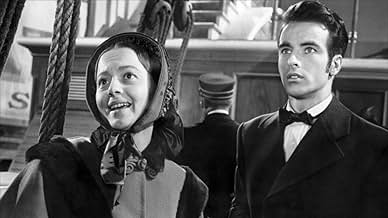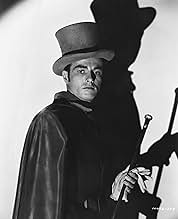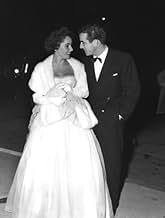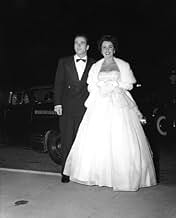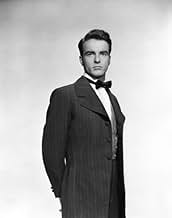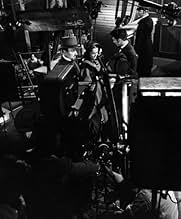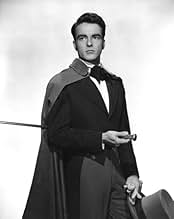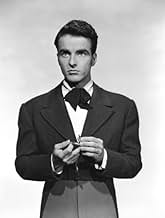IMDb रेटिंग
8.1/10
18 हज़ार
आपकी रेटिंग
एक युवा भोली महिला एक सुंदर युवक के प्यार में पड़ जाती है जिसपर उसका गालीबाज़ पिता शक करता है, वह शादी के लिए धनी लड़की की तलाश में है.एक युवा भोली महिला एक सुंदर युवक के प्यार में पड़ जाती है जिसपर उसका गालीबाज़ पिता शक करता है, वह शादी के लिए धनी लड़की की तलाश में है.एक युवा भोली महिला एक सुंदर युवक के प्यार में पड़ जाती है जिसपर उसका गालीबाज़ पिता शक करता है, वह शादी के लिए धनी लड़की की तलाश में है.
- 4 ऑस्कर जीते
- 13 जीत और कुल 9 नामांकन
Mary Bayless
- Party Guest
- (बिना क्रेडिट के)
Nan Boardman
- French Maid
- (बिना क्रेडिट के)
Jack Chefe
- French Waiter
- (बिना क्रेडिट के)
Marcel De la Brosse
- French Porter
- (बिना क्रेडिट के)
Ray De Ravenne
- French Waiter
- (बिना क्रेडिट के)
फ़ीचर्ड समीक्षाएं
Catherine (Olivia de Havilland) is a thoroughly ordinary girl with one thing commend her—her money. That's the view of her father (Ralph Richardson), who believes he is cruel only to be kind. He takes a dim view of the handsome and charming man (Montgomery Clift) who courts her. Surely this idler's only possible motive for proposing marriage is to get her money. Catherine's aunt (Miriam Hopkins) may agree, but believes the two should marry anyway. Catherine is deeply in love, but her fiancé will forever change her view of herself, of her father and of human nature as a whole.
William Wyler directs Augustus and Ruth Goetz's adaptation of their own play, suggested by Henry James's "Washington Square," and it's a fine job by all. We rarely see such a subtle and precise view of people, presented in a way that allows us to draw our own conclusions about them. Is the father villainous and cruel? Is the fiancé a fortune hunter? Do we approve or disapprove of Catherine's decisions throughout the film? We're not told what to think.
De Havilland is fine at conveying the various shades of her many-faceted character. Richardson is excellent, making the most of his mellifluous voice and superb manners. Clift is good, though his diction is lazier than that of his co-stars'. I find Clift smug and unappealing, which doesn't detract from this particular character. Miriam Hopkins, a former leading lady, aged into character parts, gives a performance rich in detail and humor. Highly recommended.
William Wyler directs Augustus and Ruth Goetz's adaptation of their own play, suggested by Henry James's "Washington Square," and it's a fine job by all. We rarely see such a subtle and precise view of people, presented in a way that allows us to draw our own conclusions about them. Is the father villainous and cruel? Is the fiancé a fortune hunter? Do we approve or disapprove of Catherine's decisions throughout the film? We're not told what to think.
De Havilland is fine at conveying the various shades of her many-faceted character. Richardson is excellent, making the most of his mellifluous voice and superb manners. Clift is good, though his diction is lazier than that of his co-stars'. I find Clift smug and unappealing, which doesn't detract from this particular character. Miriam Hopkins, a former leading lady, aged into character parts, gives a performance rich in detail and humor. Highly recommended.
10Ritag2
The Heiress has to be one of the greatest movies ever made. There is nothing about it that I would change. The cast is perfect. Montgomery Clift is so wonderful as Morris Townsend. His physical beauty makes it easy to understand how someone as gauche as Catherine Sloper could overcome her shyness and respond to him. Olivia de Havilland is almost too good looking to be the unattractive Miss Sloper, however her great acting overcomes her beauty, and the viewer readily accepts her in the part. Ralph Richardson is perfect as Dr. Sloper. With his disdain for his daughter and his idealization of her dead mother, it is easy to see how his attitude has frozen his daughter in her insecurity about everything that she does. Miriam Hopkins is the perfect airhead social climber who does have affection for her niece, but becomes so wrapped up in the overall romance of the situation that she doesn't act in the best interests of her niece but in the best interests of the romantic drama that is unfolding around her. In her biography, Edith Head talks about researching and designing the clothes for this movie. Certainly the costumes greatly enhance Olivia de Havilland's ability to play this part and be accepted as the plain and graceless Catherine Sloper. A great movie that shouldn't be missed.
10dglink
Certainly among the finest literary adaptations, "The Heiress" was based on Henry James's novel, "Washington Square" and features arguably Olivia de Havilland's finest screen performance. Morris Townsend , a handsome young man with ambiguous motives pursues Catherine Sloper, a plain spinster, who is slightly past marriageable age and possesses limited social skills. The young woman, who is the heiress of the title, is vulnerable prey for a penniless fortune hunter.
However, Montgomery Clift plays Townsend in an enigmatic manner, and viewers can debate his true intentions. Catherine's father, played by Ralph Richardson, and her Aunt Lavinia, played by Miriam Hopkins, take opposite sides in Townsend's pursuit of Catherine. Although both her father and her aunt appear to see through the handsome suitor, Aunt Lavinia is practical and sensitive to her niece's emotional needs, and she counsels compromise in pursuit of happiness, if only fleeting. However, Catherine's father is unyielding and essentially unloving in his opposition to the match. Throughout, Dr. Sloper compares his daughter's virtues to those of his late wife, and Catherine comes up lacking in every quality that he values. Sloper threatens to disinherit his daughter if she marries the suitor.
Montgomery Clift may appear shallow and transparent to some, but in essence those are the traits of his character. While Morris is slick and obviously fawning, he is not intelligent enough to be totally deceptive. Only someone as naive and needy as Olivia could fail to grasp that Morris may want something more than her love. Olivia de Havilland transcends her other performances and skillfully and convincingly evolves from a shy, introverted girl into a strong, vengeful woman. De Havilland has often portrayed women who appear genteel and soft on the outside, but whose hearts and backbones can harden into pure steel (e.g. Gone with the Wind; Hush, Hush, Sweet Charlotte), and Catherine Sloper is the finest of those roles. With able support from Richardson and Hopkins, Clift and de Havilland make the most of an outstanding screenplay, which was adapted from a stage play. William Wyler directs with a sure hand, and the atmospheric cinematography captures 19th century New York life. Period films are often unraveled by their hairstyles, which generally owe more to the year in which the film was made rather than that in which the story is set. However, even the coiffures excel in "The Heiress." De Havilland's hair looks authentic 19th century and underscores Wyler's fastidious attention to detail.
With an award-winning de Havilland performance, a handsome Montgomery Clift on the brink of stardom, and an engrossing Henry James story, "The Heiress" is one of the finest films of the 1940's. Without qualification, the film holds up to and merits repeat viewings if only to better argue the underlying motives of Clift and the fateful decision that de Havilland has to make.
However, Montgomery Clift plays Townsend in an enigmatic manner, and viewers can debate his true intentions. Catherine's father, played by Ralph Richardson, and her Aunt Lavinia, played by Miriam Hopkins, take opposite sides in Townsend's pursuit of Catherine. Although both her father and her aunt appear to see through the handsome suitor, Aunt Lavinia is practical and sensitive to her niece's emotional needs, and she counsels compromise in pursuit of happiness, if only fleeting. However, Catherine's father is unyielding and essentially unloving in his opposition to the match. Throughout, Dr. Sloper compares his daughter's virtues to those of his late wife, and Catherine comes up lacking in every quality that he values. Sloper threatens to disinherit his daughter if she marries the suitor.
Montgomery Clift may appear shallow and transparent to some, but in essence those are the traits of his character. While Morris is slick and obviously fawning, he is not intelligent enough to be totally deceptive. Only someone as naive and needy as Olivia could fail to grasp that Morris may want something more than her love. Olivia de Havilland transcends her other performances and skillfully and convincingly evolves from a shy, introverted girl into a strong, vengeful woman. De Havilland has often portrayed women who appear genteel and soft on the outside, but whose hearts and backbones can harden into pure steel (e.g. Gone with the Wind; Hush, Hush, Sweet Charlotte), and Catherine Sloper is the finest of those roles. With able support from Richardson and Hopkins, Clift and de Havilland make the most of an outstanding screenplay, which was adapted from a stage play. William Wyler directs with a sure hand, and the atmospheric cinematography captures 19th century New York life. Period films are often unraveled by their hairstyles, which generally owe more to the year in which the film was made rather than that in which the story is set. However, even the coiffures excel in "The Heiress." De Havilland's hair looks authentic 19th century and underscores Wyler's fastidious attention to detail.
With an award-winning de Havilland performance, a handsome Montgomery Clift on the brink of stardom, and an engrossing Henry James story, "The Heiress" is one of the finest films of the 1940's. Without qualification, the film holds up to and merits repeat viewings if only to better argue the underlying motives of Clift and the fateful decision that de Havilland has to make.
10eadoe
One of my favorite movies, based on one of my favorite books. Henry James sitting in the audience would have been proud of this insightful filming of his novel, "Washington Square," because the film retains so much of the subtlety of his own writing. Usually, Hollywood eliminates any of the subtlety of a great author's voice (see the recent remake of "Washington Square" if you want to see a real Hollywoodization of a novel – it actually depicts a young Catherine peeing her pants in public – an inane "Animal House"-type Hollywood requirement that degrading a woman by showing her peeing is an erotic boost for any movie). But "The Heiress" is pure James. Olivia de Havilland is perfect as James' unlikely heroine, going from an awkward gawky girl eager to please her beloved father, to a simple, loving young woman who steadfastly stands by her lover, to an embittered middle-aged woman who understands that, as Henry James says, "the great facts of her career were that Morris Townsend had trifled with her affection, and that her father had broken its spring."
If you liked this movie, read the novel. Listen to James' descriptions of Catherine and her father and see if this isn't exactly what Ralph Richardson and Olivia deHavilland portrayed:
"Doctor Sloper would have liked to be proud of his daughter; but there was nothing to be proud of in poor Catherine."
"Love demands certain things as a right; but Catherine had no sense of her rights; she had only a consciousness of immense and unexpected favors."
" 'She is so soft, so simple-minded, she would be such an easy victim! A bad husband would have remarkable facilities for making her miserable; for she would have neither the intelligence nor the resolution to get the better of him.' "
"She was conscious of no aptitude for organized resentment."
"In reality, she was the softest creature in the world."
"She had been so humble in her youth that she could now afford to have a little pride . . . Poor Catherine's dignity was not aggressive; it never sat in state; but if you pushed far enough you could find it. Her father had pushed very far."
Clifton Fadiman, in his introduction to "Washington Square," says that the novel's moral is: "to be right is not enough. Dr. Sloper is 'right'; he is right about the character of Townsend, he is right about his own character, he is right about the character of Catherine. But because he can offer only the insufficient truth of irony where the sufficient truth of love is required, he partly ruins his daughter's life, and lives out his own in spiritual poverty."
Dr. Sloper's contemptuous "rightness," penetrating and accurate as it is, is no substitute for the kindness and love his adoring daughter craves from him. In "The Rainmaker," a great Katharine Hepburn movie, also about a plain woman seeking love, only this time with a loving father, the character of Hepburn's father sums up this moral that "to be right is not enough" when he says to his self-righteous son: "Noah, you're so full of what's right that you can't see what's good!"
If you liked this movie, read the novel. Listen to James' descriptions of Catherine and her father and see if this isn't exactly what Ralph Richardson and Olivia deHavilland portrayed:
"Doctor Sloper would have liked to be proud of his daughter; but there was nothing to be proud of in poor Catherine."
"Love demands certain things as a right; but Catherine had no sense of her rights; she had only a consciousness of immense and unexpected favors."
" 'She is so soft, so simple-minded, she would be such an easy victim! A bad husband would have remarkable facilities for making her miserable; for she would have neither the intelligence nor the resolution to get the better of him.' "
"She was conscious of no aptitude for organized resentment."
"In reality, she was the softest creature in the world."
"She had been so humble in her youth that she could now afford to have a little pride . . . Poor Catherine's dignity was not aggressive; it never sat in state; but if you pushed far enough you could find it. Her father had pushed very far."
Clifton Fadiman, in his introduction to "Washington Square," says that the novel's moral is: "to be right is not enough. Dr. Sloper is 'right'; he is right about the character of Townsend, he is right about his own character, he is right about the character of Catherine. But because he can offer only the insufficient truth of irony where the sufficient truth of love is required, he partly ruins his daughter's life, and lives out his own in spiritual poverty."
Dr. Sloper's contemptuous "rightness," penetrating and accurate as it is, is no substitute for the kindness and love his adoring daughter craves from him. In "The Rainmaker," a great Katharine Hepburn movie, also about a plain woman seeking love, only this time with a loving father, the character of Hepburn's father sums up this moral that "to be right is not enough" when he says to his self-righteous son: "Noah, you're so full of what's right that you can't see what's good!"
To call this film well-acted is like calling "Citizen Kane" a nice movie and Alfred Hitchcock an "okay" director. William Wyler was known for eliciting excellent performances from his actors (he's responsible for them receiving a record 14 Oscars in acting; more than twice as many as any other director) and in "The Heiress" he's in top form. This movie should be played in every acting class ever taught to show the brilliance of subtlety and range of expressions possible when one is conveying a character's inner emotions.
Olivia De Havilland is a beautiful woman, but you believe she's an ungainly bundle of shy awkwardness in the role of Catherine Sloper. And her transformation to a cruel wounded creature is perfectly believable. And Ralph Richardson as Dr. Sloper and Miriam Hopkins as Aunt Lavinia are letter perfect beside her. Sir Ralph (at least, I THINK he was knighted) can do more with stillness and a flick of an eyebrow than any actor I've ever seen (including Brando, Penn and any other method actor you care to toss into the mix). He was robbed at the Oscars.
Montgomery Clift was beautiful and seductive and, except for a couple of moments where he seemed too 1950s instead of 1850s, just right for the part. He almost holds his own with Sir Ralph when they meet to discuss him marrying Catherine, but he did do better work in "A Place In The Sun" and "From Here To Eternity."
Wyler's simplicity and grace in directing only enhanced the story. The use of mirrors to deepen emotional content (as in when Dr. Sloper, now ill, goes to his office after getting the cold shoulder from Catherine) is stunning. So is his willingness to let a scene play out rather than force along the pacing of the moment, as so many directors do, today (as in when Catherine offers to help her father rewrite his will).
There are no easy answers in this movie. You can think Dr. Sloper is right about Morris and only wants to protect his daughter, or you can see his actions as those of a vindictive man who blames her for the death of his beloved wife (in childbirth). Morris could be a fortune hunter, or he could be a man who does care for Catherine, in his own way, and would make her happy. Or all of the above. The whole movie is so beautifully composed, it's breathtaking. A definite must see for anyone who appreciates great stories well-told.
Olivia De Havilland is a beautiful woman, but you believe she's an ungainly bundle of shy awkwardness in the role of Catherine Sloper. And her transformation to a cruel wounded creature is perfectly believable. And Ralph Richardson as Dr. Sloper and Miriam Hopkins as Aunt Lavinia are letter perfect beside her. Sir Ralph (at least, I THINK he was knighted) can do more with stillness and a flick of an eyebrow than any actor I've ever seen (including Brando, Penn and any other method actor you care to toss into the mix). He was robbed at the Oscars.
Montgomery Clift was beautiful and seductive and, except for a couple of moments where he seemed too 1950s instead of 1850s, just right for the part. He almost holds his own with Sir Ralph when they meet to discuss him marrying Catherine, but he did do better work in "A Place In The Sun" and "From Here To Eternity."
Wyler's simplicity and grace in directing only enhanced the story. The use of mirrors to deepen emotional content (as in when Dr. Sloper, now ill, goes to his office after getting the cold shoulder from Catherine) is stunning. So is his willingness to let a scene play out rather than force along the pacing of the moment, as so many directors do, today (as in when Catherine offers to help her father rewrite his will).
There are no easy answers in this movie. You can think Dr. Sloper is right about Morris and only wants to protect his daughter, or you can see his actions as those of a vindictive man who blames her for the death of his beloved wife (in childbirth). Morris could be a fortune hunter, or he could be a man who does care for Catherine, in his own way, and would make her happy. Or all of the above. The whole movie is so beautifully composed, it's breathtaking. A definite must see for anyone who appreciates great stories well-told.
क्या आपको पता है
- ट्रिवियाDirector William Wyler shot 37 takes of Olivia de Havilland carrying her suitcases up the stairs. Only after the final shoot, whereupon she briefly stopped on the second flight of stairs and leaned on the handrail for a couple of seconds, did Wyler declare that this was the take he wanted to print.
- गूफ़This story takes place at the end of the 1840s, but none of the men wear the cravats--material bound around the neck and tied in either the front or back--that were fashionable in that period; instead they wear neckties and bow ties, which did not come into fashion until the late 1850s.
- भाव
Aunt Penniman: Can you be so cruel?
Catherine Sloper: Yes, I can be very cruel. I have been taught by masters.
- कनेक्शनFeatured in AFI Life Achievement Award: A Tribute to William Wyler (1976)
टॉप पसंद
रेटिंग देने के लिए साइन-इन करें और वैयक्तिकृत सुझावों के लिए वॉचलिस्ट करें
विवरण
- रिलीज़ की तारीख़
- कंट्री ऑफ़ ओरिजिन
- भाषाएं
- इस रूप में भी जाना जाता है
- La heredera
- फ़िल्माने की जगहें
- उत्पादन कंपनी
- IMDbPro पर और कंपनी क्रेडिट देखें
बॉक्स ऑफ़िस
- बजट
- $26,00,000(अनुमानित)
- दुनिया भर में सकल
- $158
- चलने की अवधि
- 1 घं 55 मि(115 min)
- रंग
- पक्ष अनुपात
- 1.37 : 1
इस पेज में योगदान दें
किसी बदलाव का सुझाव दें या अनुपलब्ध कॉन्टेंट जोड़ें


